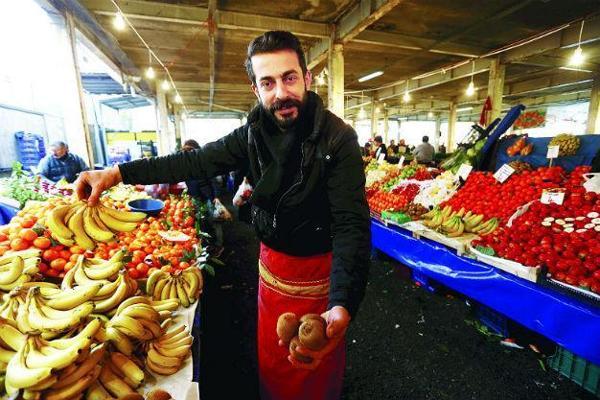Food prices fuel Turkish inflation, blame game
ISTANBUL - Reuters


REUTERS photo
Standing amid a jumble of food stalls in an Istanbul market, 61-year-old Gülşen Yüce wonders how she can stretch an already tight budget to make ends meet as food prices rise week after week.Inflation has become a leading economic challenge for Turkey, hitting the pockets of ordinary people.
“A head of lettuce is 5 lira and I have difficulty paying that much for it. I live on my own, I get by on fish or poultry instead of red meat,” said Yüce, a pensioner.
Global food prices have fallen to their lowest in nearly seven years, but Turkey has consistently struggled with food costs overshooting headline inflation - at a rate that has at times outpaced other emerging markets.
Ankara’s inability to cool the rise has fuelled a blame game among food producers and retailers, with each accusing the other of hiking prices.
Industry officials and economists say there are deeper structural problems, from the lack of a long-term agricultural policy to a supply chain hindered by middlemen and arcane bureaucracy.
“Turkey sticks out like a sore thumb among the major emerging markets whose inflation rates are significantly above target,” said Nicholas Spiro of Lauressa Advisory, an economics and property consultancy.
“There’s little indication that monetary policy will be tightened sufficiently any time soon to curb inflationary pressures, which are particularly prevalent in food despite the sharp decline in global food prices.”
Annual inflation hit 9.58 percent in January - the highest since the middle of 2014 - fuelled by an 11.69 percent rise in food prices, data showed this week. The central bank has hiked its food inflation estimate for this year to 9 percent, from 8 percent.
Central Bank Governor Erdem Başçı has cited the surging cost of bread and red meat as the main culprit and asked a government-run food committee to take measures to limit the impact on overall inflation, but it remains unclear what the committee can do. Food and beverages account for the largest portion of Turkey’s inflation basket, at 24 percent.
The price of a loaf of bread increased in Istanbul by 25 percent at the beginning of this year, while the annual increase in red meat averaged 21 percent nationally last year.
The economy minister has said Ankara will allow more red meat imports to keep prices down. But Turkey has already imported about $4 billion in meat and livestock over the last decade and that has done little to fight inflation.
Industry officials and analysts said boosting imports would be a short-term remedy at best. The bigger problem, they say, lies with scattered farm ownership that prevents large-scale farming, outdated agricultural technology and unpredictable harvests borne of poor planning.
Both the head of the red meat producers association, Bülent Tunç, and the chairman of the bakers association cited a web of middlemen as a major cause of price pressure.
“There is a problem in the supply chain,” Tunç said.
To reduce the impact of middlemen, the government enacted a law in 2012 to remove some informal intermediaries and give farmers direct access to retailers. That helped lower wholesale prices by almost 20 percent, but had little impact on retail prices, a central bank study found in 2015.
Retailers dismiss the idea that they have vast pricing power.
“That’s an urban legend,” said Nihat Özdemir, chairman of Turkey’s main association of food retailers, citing stiff competition in fresh produce. “There isn’t a single retailer who can say they profit from fresh food.”
